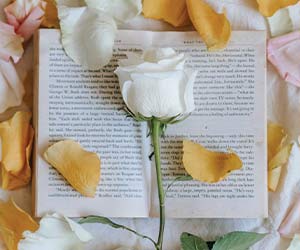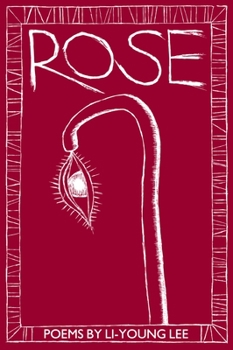Book Overview
Table of Contents I.EpistleThe GiftPersimmonsThe Weight Of SweetnessFrom BlossomsDreaming Of HairEarly In The MorningWaterFalling: The CodeNocturneMy IndigoIrisesEating Alone II.Always A Rose... This description may be from another edition of this product.
Format:Paperback
Language:English
ISBN:0918526531
ISBN13:9780918526533
Release Date:March 1993
Publisher:BOA Editions
Length:71 Pages
Weight:0.30 lbs.
Dimensions:0.2" x 6.3" x 9.1"
Customer Reviews
5 ratings
Stunning.
Published by Thriftbooks.com User , 16 years ago
Li-Young Lee, Rose (Boa Editions, 1986) I am a longtime fan of Li-Young Lee's work, but I somehow never got round to reading Rose, his first book, until now. Sometimes going back and reading the first published work of an author is interesting in that you can see how s/he developed over the years (this is reviewer-code for "man, this book is not nearly as good as I was expecting"); such is not at all the case with Lee, whose first pieces are just as polished, professional, and deeply absorbing as his most recent work: "From laden boughs, from hands, from sweet fellowship in the bins, comes nectar at the roadside, succulent peaches we devour, dusty skin and all, comes the familiar dust of summer, dust we eat. O, to take what we love inside, to carry within us an orchard, to eat not only the skin, but the shade, not only the sugar, but the days, to hold the fruit in our hands, adore it, then bite into the round jubilance of peach." ("From Blossoms") Li-Young Lee is a fabulous poet, and if you haven't yet discovered his work, I can't recommend strongly enough that you seek him out as soon as possible. A true poetic treasure. **** ½
Father as Muse
Published by Thriftbooks.com User , 18 years ago
Very rarely does the inspiration for a book of poems make itself so clearly felt throughout. In this case, the shadow of the poet's father is cast clearly across nearly every page. Part I is the homage, Part II is the eulogy and Part III is the aftermath. Every section is cooled by this shadow of loss which doesn't dissipate, even in poems that at first seem to be about something else. Still, I was taken by how powerful & beautiful & even uplifting this book is. It has a working unity that is often missing in other collections. The ever-present father figure is one key to this unity but so is the recurrence of certain images; particularly, growing things: persimmons, peaches, ivy, apples, roses, hair. His lover is a vegetable for harvest. Persimmons are a metaphor for knowledge. In "Eating Alone," the poem that closes Part I, Lee writes: "I've pulled the last of the year's young onions./The garden is bare now. The ground is cold..." Which brings us again to the poet's father and pears, but now the fruit is dead. The poet and his father walk "among the windfall pears" and his father bends "to lift and hold to my/eye a rotten pear." The poem concludes with the poet left with "my own loneliness./What more could I, a young man, want." A statement, not a question. These memories are the poet's muse, sad but necessary. Part II is the title poem, Rose, which works as an extended eulogy. At first, it seems like it will free us from the father figure as we move into Part III, where the survivors, like the poet and his mother, take on more influence. Still, Lee never really shakes his father's influence. "The Weepers," for example, reminds us of the continuing presence of grief. And yet, despite the melancholy that hangs over the book, it is a wonderful read. I have yet to read a collection of poems where every poem is great but this one works towards it. Maybe because the whole thing feels like a single, extended poem rather than individual one. In any case, I highly recommend this book.
one of the best living poets, sublime writing
Published by Thriftbooks.com User , 23 years ago
Mr Lee is one of my favorite poets, period. The Rose is a wonderful collection, and I think I like it a tiny bit better than The City In Which I Loved You. The way that Mr. Lee captures love & longing, subtle forms of love, nuances of parental relationships, and the physical world is amazing. The first time I read 'Persimmons' it was in a Pushcart Prize Anthology, and I had never seen anything by Lee. It was years ago, and with no access to a printer or computer (stuck on holiday) I hand wrote at least 5 copies to immediately put in the mail to friends because I loved the poem so. Every poet resonates differently, it happens that Mr. Lee echoes some voice that I really understand and appreciate. If you love words, and how they can move together into something magical, he is one to read.I wanted to include an excerpt, but I'm not sure that's right. Do a web-search on him if you want to see what sort of writing style it is. It's difficult to take a stanza out of context, and it's too hard to pick one. :)p.s. If you happen to agree with my taste, and you don't know about The Weight of Oranges by Anne Michaels, that's another rewarding read.
Lee's quiet precision is powerful poetry
Published by Thriftbooks.com User , 24 years ago
Like a child who possesses a sensual, adult relationship with the world, Li-Young Lee radiates with an open gentleness and delicate sensitivity that seems, at times, almost too fragile to allow him to walk the streets alone. Nothing escapes his keen eye and, as he so poignantly illustrates, the greatest art is all around us, in glimpses that, when combined with memory, produce a renewal of the spirit. Lee's poetry results in a clarification or awakening of feelings that summon the reader's desire to examine his or her feelings, and by examining them, express them. Thus, by reaching into our own self-awareness, we are able to seek redemption. We forgive ourselves. Li-Young Lee is at the leading edge of what is good about contemporary, American poetry. After devouring all his works, my only complaint is that there is too little of it. More, please.
One of the best poets today capturing the struggle of living
Published by Thriftbooks.com User , 27 years ago
Li-Young Lee's poetry is lucid in the way he captures the details of living with accuracy and tenderness, it moves the reader to awe. In poems such as "The gift" and "Early in the morning," Lee reveals the way our families create who we are in a manner that heals the reader and makes us examine our own lives. Lee often writes about his father and his own attempt to understand his connection to him and the heritage bestowed on him. In "The Gift" Lee uses a splinter as the union of everything that is valuable in his life and all our lives.
Rose Mentions in Our Blog

Poetry for Beginners
Published by Ashly Moore Sheldon • November 15, 2021
Amanda Gorman stole the show last January when she shared her poem The Hill We Climb. Her evocative, energizing voice offered a fresh, accessible take on what many consider to be an esoteric, staid genre. Her new book, Call Us What We Carry, comes out on December 7 and here we spotlight fifteen other poets whose verses provide a good entry point into the dynamic artform of poetry.




